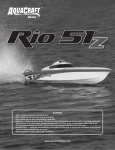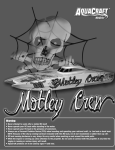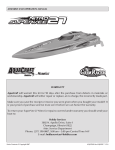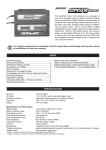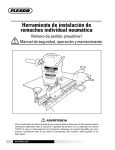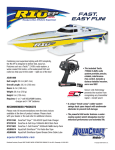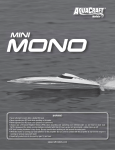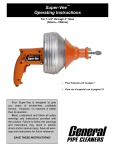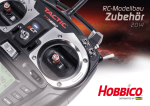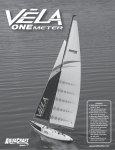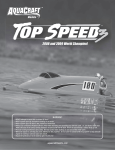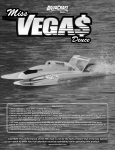Download AquaCraft Top Speed 2 HCAB5011 Specifications
Transcript
™ ™ WARNING: • NEVER attempt to swim after a stalled RC boat! • Never operate your RC boat while standing in the water. • Never operate your RC boat in the presence of swimmers. • Always use a Personal Flotation Device (PFD) when boarding and operating your retrieval craft, i.e. Jon boat or duck boat. NOTE: Because of the sharp running hardware included with this RC boat, we do not recommend a rubber blow up raft. • RC boat running hardware is very sharp. Be very careful when working on and around the metal parts. • While the motor is running pay close attention to the propeller. Do not come in contact with the propeller at any time the engine is running or serious injury will result. • AquaCraft products are to be used by ages 14 and over. aquacraftmodels.com INTRODUCTION & DESCRIPTION CHANGES OPTIONAL PARTS Thank you for purchasing the AquaCraft SuperVee 27R. We at AquaCraft want the time you spend with your boat to be safe, fun and successful. If for any reason you feel this R/C model is not for you return it to your place of purchase immediately. Your hobby dealer cannot accept returns on any model after final assembly or after your boat has been operated. ❏ GPMQ4480 Hook and Loop: Remember if you purchase extra battery packs you are going to need to purchase extra hook and loop as well. ❏ AQUB9700 40X52 3-bladed prop (this prop closely mimics the stock plastic prop but with better overall performance) ❏ AQUB9725 42X55 2-bladed prop (this prop has great acceleration as well as top speed) ❏ AQUB9514 Grimracer Pro Radio Box Tape (most top competitors tape shut the perimeter of the cowl to help keep water out of the boat) ❏ AQUB9500 Grimracer Speed Grease (you are going to need to re-grease the drive cable after each day of running) ❏ AQUB6322 Grimracer decal set (let them know that you’re ready to race!) AquaCraft products are to be used by ages 14 and over. All pictures, descriptions, and specifications found in this instruction manual are subject to change without notice. AquaCraft™ maintains no responsibility for inadvertent errors in this manual. PARTS NEEDED TO COMPLETE YOUR MODEL ❏ 4 – AA Batteries (transmitter) For your convenience we have listed below a few different battery and charger options. Most 7.2V NiMH battery packs of around 3000mAh or larger will work quite well in the SuperVee 27R. It is also important to note that chargers come in both DC and AC/DC versions. DC chargers require a 12V power supply like a 12V car battery or bench top power supply to power up the charger. AC/DC chargers allow you to plug the charger into a 120V house outlet or DC power supply, therefore making them more convenient for most charging situations. OPTION 1: (This is about the minimum cost and performance one would need to own to operate your SuperVee 27R.) ❏ DTXC2054 Onyx™ 3000mAh NiMH battery pack (2)–you need two battery packs to operate the boat. ❏ DTXP4002 Piranha DC Charger OPTION 2: (This is a good middle of the road option; you will get good battery performance as well as an AC/DC charger.) ❏ DTXC2145 Onyx 3800 NiMH battery pack (2) ❏ DTXP4200 Onyx 200 sport peak charger OPTION 3: (This option will provide the longest run times and best over-all performance, as well as allow you to charge both batteries at the same time.) ❏ DTXC2151 DuraTrax® 5000mAh NiMH battery pack (2) ❏ DTXP4240 Onyx Dual AC/DC charger 2 Grimracer says: Now is a good time to get your batteries on charge! WARRANTY SERVICE AquaCraft will warrant your SuperVee 27R for 90 days after the purchase from defects in materials or workmanship of original manufacture. AquaCraft, at their option, will repair or replace at no charge the incorrectly made part. This warranty does not cover damage caused by crash, abuse, misuse, alteration or accident. To return your boat for service you need to provide proof of purchase. Your store receipt or product invoice will suffice. IN NO EVENT SHALL THE PURCHASER BE ENTITLED TO ANY INCIDENTAL, SPECIAL, INDIRECT OR CONSEQUENTIAL DAMAGES, WHETHER RESULTING FROM THE USE, MISUSE OR INABILITY TO USE THE PRODUCT OR FROM DEFECTS IN THE PRODUCT. This warranty gives you specific legal rights and you may also have other rights, which vary from state to state. Outside USA and Canada, contact local importer for warranty information. Hobby Services 3002 N. Apollo Drive, Suite 1 Champaign, Illinois 61822 Attn: Service Department Phone: (217) 398-0007 9:00 am - 5:00 pm Central Time M-F E-mail: [email protected] OTHER FEATURES: SAFETY PRECAUTIONS • Never, ever attempt to swim after a stalled RC boat. DO NOT get in the water for any reason to retrieve your boat. Your SuperVee 27R has flotation added to the interior of the hull and the cowl; they will not sink. To aid you in retrieving a stalled RC boat, you can use a fishing reel with a tennis ball tied to the end of the line. Or better yet, get yourself a small Jon boat so you can row out and pick up your boat. Remember to use a PFD any time you enter your retrieval craft. • Do not touch the propeller anytime the motor is running. Pay equally close attention to items such as loose clothing, shirtsleeves, ties, scarves, long hair or anything that may become entangled in the spinning prop. If your fingers, hands, etc. come in contact with the spinning propeller, you may be severely injured. • The speed and mass of this boat can inflict property damage and severe personal injury if a collision occurs. Never run this boat in the presence of swimmers or where the possibility of collision with people or property exists. • This boat is controlled by radio signals, which are susceptible to possible interference from RF sources. It is a good idea to precheck the system to make sure it’s operating properly before you launch your boat. • If your SuperVee27R should happen to stall, water currents will slowly carry it to shore. The bad news is the boat could be carried to the opposite shore. When surveying areas to run your model, keep variables in mind such as wind direction, size of the lake, etc. It is not advisable to run R/C boats on any free-flowing bodies of water such as creeks or rivers. Hand-laid fiberglass construction High-gloss painted finish Water-resistant radio box Brass stuffing tube Low-friction cable guide .150" flex drive cable Standard 3/16" (.187") prop shaft 40mm Fiber Reinforced Plastic (FRP) Propeller Aluminum hardware nut plates SPECIFICATIONS: Hull Length: 27" (685mm) Overall Length: 31" (790mm) Width: 8" (204mm) Height: 6.5" (165mm) Empty Weight: 53oz Weight RTR: 84oz MOTOR SPECIFICATIONS: Diameter: 36mm Length: 56mm Shaft Length: 15mm Overall Length: 71mm Shaft Size: 5mm Connectors: 4mm Bullet Weight: 212g Input Voltage: 7-18.5v Max. Constant Current: 50A Max. Surge Current: 80A/five seconds No Load Current: 5.0A kV Rating: 1800 rpm/V Watts: 925Max ESC SPECIFICATIONS: FEATURES & SPECIFICATIONS NEW SUPERVEE 27R FEATURES: Tactic™ 2.4GHz radio system New 1800 KV 6-pole motor Stronger hull seam joint New aluminum motor cooling jacket New water cooling jacket for the ESC Addition of a port side turn fin Black anodized hardware Updated center of gravity for better handling Transom mounted water cooling pickup Stronger interior mounted motor rails Custom built and installed tow hook Stronger hook and loop battery mounting New graphics package Length: 80mm Width: 38mm Height: 17mm Wire Gauge: 14g Battery Connectors: Male Deans® Ultra Plugs® (2) Motor Connectors: 4mm Bullet connectors (3) Input Voltage: 12-14 cells NiMH, (8-20V w/o BEC) Output Current: 45A continuous, 60A max surge Max Output Power: 900 watts On-resistance: 0.003 ohms Operating frequency: 8kHz BEC: 5.2V/2A Thermal Cutoff: 110C Timing Angle: 10° WARNING: This ESC is not designed to be used with LiPo batteries! 3 FINAL ASSEMBLY 1. Install 4AA batteries into the transmitter. Turn on the transmitter, making sure it’s working by viewing the LED on the front. The LED should glow bright red. 2. Remove the canopy by rotating the lock 90° to unlatch the canopy. 3. Remove the hook and loop from the battery area inside the boat and attach it to your battery packs. 4. Install the batteries into the boat, making sure they are well-seated. 4 START UP & OPERATION PROCEDURE 1. Turn on your transmitter, taking note that the power light is illuminated. 2. Stand clear of the propeller and plug each of the main batteries into the ESC. 3. At this time you will hear one beep. To arm the ESC, squeeze the throttle trigger and hold until you hear one more beep. Release the throttle trigger and you will hear three more. Your boat is now ready to operate. 4. If your boat does not beep after plugging in the batteries, turn the throttle trim knob either left or right until you hear the boat beep. 2 % 6 ) % 7 Plug in the packs Squeeze the throttle trigger and hold Release the trigger You boat is now ready to operate! One (1) beep One (1) beep Three (3) beeps Now is a good time to check the rotation of the prop. Very quickly jab the throttle trigger and check the direction of the motor. It should spin the propeller counterclockwise when viewing the boat from the back. If the motor spins the wrong way, simply switch any two of the three wires between the motor and the ESC. Warning: Do not hold the throttle down for more than one or two seconds to check the motor direction or you might risk damaging the motor. Also check the steering direction. When you turn the wheel to the right, the back of the rudder blade should also move to the right. Install the cowl and snap it in place by pushing down on the back latch. You are now ready to run the boat. Launch the boat in water that is at least 12" deep and weed free. You can set the boat still in the water and hit the throttle or you can hand launch it (toss the boat in with a forward motion and power up as the boat hits the water). The boat will leave using either method. When using the still method, you are going to have to be quite aggressive with the throttle to get the boat on plane. When the batteries are exhausted, bring the boat in and unplug the batteries. Be careful as the motor and batteries can become very hot during operation. TIPS AND NOTES: The handling and performance of your SuperVee 27R can be disrupted by the smallest obstructions in the water. If you happen to pick up a small duck feather or leaf, the power system could draw more current than the ESC is capable of handling; the performance of the boat will be compromised and you could damage the motor, ESC or batteries. Please make sure the water you are running in is clear of obstructions. Its also important to note that if you operate the boat for extended periods of time at less than full throttle, you can overheat the ESC. It is a good idea to get into the habit of looking for water squirting out the water cooling exit on the port side of the boat. When the boat is in operation water will be squirting out of the exit about 8" to 12". TROUBLE SHOOTING: • No signal between the transmitter and the boat: Check to make sure the transmitter is bound to the receiver. To bind, open the radio box by prying up on the side tabs. Remove the protective balloon from the receiver. With the transmitter turned on and the batteries plugged into the boat, press and hold the bind button on the top of the receiver (use a tooth pick or other small pointed object) for approximately 4 seconds or until the system binds. You will know it’s bound when the small LED hidden behind the face of the receiver stops flashing and stays lit. • Boat runs backwards: Switch any two of the three motor wires. • ESC will not arm: Move the throttle trim knob slowly clockwise and then counterclockwise to adjust the center point of the throttle system. Also check the throttle reverse switch to make sure it is in the down position. • Boat is slow to take off: This is called cavitation and is normal with the stock prop. Try being more aggressive with the throttle during the launch or toss the boat forward with more force, applying power as the boat touches the water. It is also important to note that metal props flex less, reducing cavitation. • Boat slows down or shuts off in the middle of a run: Check for weeds on the prop or any obstruction blocking the water cooling pickup. • After a run the motor and batteries are VERY hot: Check to make sure the water pickup is not plugged. Check to see that the prop is not broken or that you have changed to a propeller that is too large for the power system. 5 MOTOR MAINTENANCE After each day of operation we feel it’s best to remove the motor, flush it out with a moisture displacer and re-oil the bearings. You are going to need the following tools and supplies. 12mm open end wrench 10mm open end wrench 1.5mm hex wrench 2.5mm hex wrench Pliers Water displacer (WD-40, CRC-56 or Corrosion X) Bearing oil Paper towel Start by removing the radio box. Taking the box out is not necessary but it does make this procedure a lot easier to do: 1. Use a set of pliers to detach the ball link off of the tiller arm. Just rotate it and it will pop off. 2. Unscrew the ball link, counting the turns as you remove it. 3. Pull the water pickup line off of the transom mounted water pickup. 6 4. Remove the two water lines that attach to the motor cooler. 5. Unplug the three 4mm connectors leading to the motor. 6. Use a 2.5mm ball driver or hex wrench two remove the two M3 screws holding the radio box in place. 7. Slide the box forward, slipping the water pickup line and rudder push rod out of the boat as well. Lift the box out and set aside. 7 8. Use a 1.5mm hex wrench or hex driver to loosen the set screw that holds the flex coupler to the motor shaft. You don’t have to remove the set screw; just loosen it. 9. Using a 2.5mm wrench, loosen and remove the two motor screws. 10. Remove the motor from the boat and spray the entire motor with moisture displacer. Make sure to fully saturate the motor. This is also a good time to spray the displacer through the water jacket. Removing any water from there is equally important. 11. After you have the motor flushed out, re-oil the motor bearings.Reinstall the components by reversing the above procedure. 8 SHAFT MAINTENANCE After each 5 or so runs and after your day of running it’s a good idea to re-lubricate the drive cable. Here are the tools and supplies you need to complete the task. 10mm open end wrench 12mm open end wrench AquaCraft Grimracer Speed Grease (AQUB9500) Paper towel Let’s begin. 1. Loosen the cable coupler using the 10 and 12mm wrenches. 2. Firmly pull the prop and drive shaft out of the back of the boat. Wipe away any old grease and water. 3. Apply new speed grease to the shaft and slide it back into the strut, moving it in and out as you do so to help spread the grease along the length of the cable. 9 4. Before tightening the cable coupler, make sure to leave a 4 or 5mm distance between the back of the strut and the front of the drive dog. This will keep the drive system from binding or breaking as the cable operates. 5. Tighten the cable coupler, reversing the direction of the open end wrenches. DO NOT OVER TIGHTEN. NOTE: The drive cable is supported by the brass stuffing tube which has a low friction liner. The prop shaft (or “stub shaft”) is hard-soldered to the flexible drive cable and spins in a brass bushing located in the back of the stuffing tube. The bushing and low friction liner should be replaced when they start to show wear. (AQUB7884 Prop Shaft Bushing SuperVee 27; AQUB7869 .150" Cable Liner 10", cut to length as needed.) Grimracer Says: There are quite a few things you can do to increase the performance. One is spending time optimizing and tuning the drive cable. Things like making sure the drive cable is perfectly aligned with the cable coupler as well as making sure the drive system does not bind are the key to winning races. Keep this in mind as you learn all about setup and tuning your new boat. At the end of the day make sure to leave the cowl off the boat overnight as well as the lid of the radio box. This will allow any moisture that collected in the boat to safely evaporate. 10 TUNING TIPS AND PROP INFO STRUT: The type of strut your boat is supplied with is called a “Stinger” strut. “The Business End of the Boat” Tilting the strut up lifts the prop out of the water as well as changing the thrust angle to positive. Lowering (tilting down) does the opposite. It is good to keep in mind that lowering the prop or tilting down causes the prop to run deeper, supplying more load and causing the boat to run tighter as well. When adjusting the strut, make very small adjustments at a time. To adjust the strut we recommend removing the two larger center bolts from the strut and very carefully bending the stinger’s brass stuffing tube up or down. Re-install the bolts and tighten. When making smaller adjustments you do not have to remove the bolts. Also note that if you feel you want to go past the adjustment limits of the boat, you might have to slide the stinger off the stuffing tube and file or remove some of the forward boss feature of the strut. Grimracer Says: Use a 12" or 24" straight edge placed along the bottom of the keel to help view the changes. Here is a simple “how to” regarding adjusting the strut: 1. Use a 3mm hex wrench to loosen and swing the starboard turn fin up and out of the way. 11 2. Using the same 3mm hex wrench and a 7mm nut driver (Note: you are going to need a thin wall nut driver) remove the two center strut bolts and set aside. 3. You can now see that the center strut is free from its mount and can be removed if needed. Grimracer Says: Here is a great race tip if you wish to follow along. With the strut removed, file the forward boss away from the strut. This will give you more room for adjustments if needed. I also like to place a radii around the bottom edge of the strut. This assures minimal lift is created from any water that approaches the leading edge of the strut. 4. With the strut slid back fully on to the back of the stuffing tube, use a firm but gentle pulling motion to hyper-extend the brass stuffing tube. You really only need to bend it about 5 or 6mm to get enough room for adjustment. Take your time. If you pull it too hard you could damage the stuffing tube. 12 5. With the strut in position replace the two center bolts. You can use a metal ruler or straight edge to help view your changes. The point regarding removing the strut to yield the brass tubing is this: The brass tubing acts a bit like a spring. We have found it easier to preload the strut in a negative position. Then, set the angle of the strut by pushing up on the strut and tightening the bolts to hold it in place. TRIM PLATES: The trim plates are located on the back transom and are used to fine-tune the ride of the hull. The further down you tilt the plates, the “tighter” the boat will run. This “tighter ride” will help stabilize the boat but at the risk of more power consumption as well as a loss of speed. It’s also important to note that this “tight ride” could cause the ESC and/or motor to overheat. Be mindful of this as you tune your ride plates. Tilting the plates up will loosen the ride and increase the speed but at the risk of the boat becoming unstable. Take your time adjusting the trim plates and make one small change at a time. Test and repeat until you have the desired boat ride. Although this adjustment appears somewhat similar to the strut adjustment, the real difference is this set of adjustments does not lower or raise the prop from the water. You can use a large pair of pliers to adjust the trim plates. Remember, just tweaking the plates a very small amount can drastically change the way the boat runs. RUDDER: The rudder can be tuned in a variety of ways. The most important aspect is how sharp it is or you make it. Using a flat file, sharpen the leading edge of the rudder, finishing with 400grit, then 600grit wet-dry sandpaper. You can also gain some performance if you remove the lift the rudder makes off the bottom of the blade. You can either round or sharpen the bottom of the blade as well, as either method works. Another important aspect is the angle front to back of the rudder blade. The further back you tilt the rudder, the looser the boat will run. The further under the boat the tighter. Keep in mind as you do this that this adjustment does not have the same effect as the trim plates. Adjusting the rudder has a larger effect on straight line performance-vs-cornering performance. Keep this in mind as you tune the rudder blade. 13 CG: Adjusting the CG or center of gravity of the boat has a lot to do with how tight the boat rides as well as the how the boat “flies” as it exits the water. Moving the battery packs forward or rearward is the best way to adjust the CG. SCUFFING: Scuffing is a tuning trick boat racers use to increase the speed of their boat. Scuffing involves dulling the area/s of the boat that touch the water as the boat is running. We like to use a red scratch pad like the ones you find in the paint section of your local home supply store. Only scuff the bottom of the boat to the point the shine is removed from the paint. While this tuning trick is mostly geared towards the hard core boat racer, sport runners can benefit from this as well. PROPS: About the best we can do is help guide you to a better performing prop. Ultimately how you drive and tune your boat will determine the best prop for your racing program. Having said that we have found the GrimRacer 40x52/3 (AQUB9720) or GrimRacer 42x55 (AQUB9725) are about the best overall props for your SuperVee 27R. It is also advisable that you balance your propeller when it is new and check it for balance periodically. If you want to learn more about tuning props check out some of the links listed in the “National Organizations and Online Help” section of this manual. You can also learn more about balancing and sharpening your prop at aquacraftmodels.com. IMPORTANT! Scuffing will remove the attractive shine from the bottom of your hull. If having a pretty finish is important to you, don’t scuff! GRIMRACER HIGH-PERFORMANCE METAL PROPELLERS Give your SV27R an added burst of speed—as easily as bolting on a high-quality copper-beryllium-titanium GrimRacer metal prop! Racer-designed and USA-made, these are the most accurately cast metal props available. Ultra-clean casting and true center-bore hubs place each prop near its balance point right out of the package. You can fine-tune them using less effort than stainless steel props require—and they hold their shape better for balancing, sharpening, and changing pitch. Stock # AQUB9720 AQUB9725 Description 40 x 52/3 42 x 55 Type 3-Blade 2-Blade Diameter 40mm 42mm Pitch 52mm 55mm Bore 3/16" 3/16" Precision cast from Copper-Beryllium-Titanium! GRIMRACER PRECISION PROP BALANCER To maximize performance—and minimize damage to on-board electronics and parts—balance your props with the GrimRacer Precision Prop Balancer. It’s easy to use. Three thumb screws provide perfect level adjustment, and a precise bubble level is built into the one-piece extruded aluminum base. The balancer includes balancing shafts for 1/8" (3.2mm), 3/16" (4.8mm) and 1/4" (6.4mm) bore prop hubs. Propeller not included. AQUB9575 14 RACING Below are a set of racing rules provided to use from our friends of the Puget Sound Fast Electric Model Boat Club based in Washington State. These rules have been taking off across the country and can help you and your friends come up with your own racing program. • This class is a spec series for the AquaCraft SuperVee27R (SV27) RTR Brushless Mono in its stock form. Only a select set of well defined modifications will be allowed. The boat will otherwise remain OEM stock. • Spec SV27 races will be held as either a standard 5-Lap Sprint Race or a 10-Lap endurance race. The hosting club shall announce the official race length prior to date of the race. ALLOWED MODIFICATIONS: • The SV27 must remain in stock form, using only OEM parts as delivered, with the exception of the following allowances: • Factory flex cable assembly and motor coupler may be replaced with any .150" Flex cable assembly and appropriate motor coupler. The distance from the transom to the propeller shall not be altered. Motor output shaft may be trimmed to facilitate installation of motor coupler and to increase coupler to stuffing tube clearance. • Material may be removed at the forward end of the strut housing to eliminate interference with the transom, but no further aft than the leading edge of the strut’s vertical mounting bracket. • Holes in the stock trim tabs may be opened up to allow tabs to be aligned flush with the bottom of the hull. Alternate trim tabs may be fitted provided they serve no other purpose and that the wetted area does not exceed 33mm (1.3 in.) in length by 29mm (1.14 in.) in width. Alternate tabs may be adjustable. Alternate tabs must be mounted in the OEM location and have the width of the wetted area centered on this location. • Stock turn fin must be retained unmodified, but the leading edge may be sharpened. No modifications to the mounting bracket or bracket location are allowed. No additional fins are allowed. A mounting bracket for a left side fin may be present, but shall not be used. • Stock rudder may be sharpened and water cooling hole may be cleaned up to improve cooling. No other modifications to rudder are permitted. • Motor Water cooling jacket may be replaced. Water cooling outlet may be modified or replaced. Water cooling tubing may be replaced. • Receiver and transmitter may be replaced. • Any antenna may be used. Holes may be drilled in the hull to mount a replacement antenna, provided they serve no other purpose. Existing antenna hole may be filled or covered. • The hull, from the chine up, may be painted or have graphics applied as desired. Hull bottom may be “scuffed”, but must otherwise remain stock. • Any adjustment within the designed range of adjustment for any part is permitted. No part may be modified to provide adjustment beyond the given factory tolerances. • Fasteners may be replaced with metric or standard replacements. • Hatch may be taped down. Factory locking mechanism may be removed and existing holes filled or taped over. • Battery requirements: Any capacity Sub-C NiMH 12-cell battery set will be permitted. OEM connectors shall be retained. • OEM propeller shall be used. Propeller may be cleaned up to remove flashing, but must otherwise remain unmodified. • Alternately, a hosting club may specify a propeller for an event, provided they supply supplemental regulations clarifying the propeller selection. The host club must take measures to insure that all propellers for the event are prepared as equitably as possible and to notify competitors in advance of the propeller selection. • Records shall only be maintained using the OEM propeller as specified above. • No other modifications or substitution of parts is permitted. Any repairs required due to race damage must be done in a fashion so as to return the SV27 to its factory specifications. Inspection for compliance with these rules will be at the discretion of the event CD, and boats exhibiting modification or unauthorized repairs beyond the scope of these rules will be excluded from competition. 15 REPLACEMENT PARTS ALSO AVAILABLE FROM AQUACRAFT To order replacement parts for the SV27R, use the order numbers in the Replacement Parts List that follows. Replacement parts are available only as listed and can be purchased from hobby shops or mail order/ Internet order firms. Hardware items (screws, nuts, bolts) are also available from these outlets. If you need assistance locating a dealer to purchase parts, visit www.hobbico.com and click on “Where to Buy.” If this kit is missing parts, contact Hobbico Product Support. Order # Description AQUG7002 ... Marine Brushless Motor 6-Pole 1800kV AQUM7005 .. Marine Brushless Water-Cooled ESC, 45 Amp AQUB8746 ... Rudder Blade w/Set Screws & Hinge Pin AQUB8747 ... Rudder Bracket w/Mounting Bolts & Backplate AQUB8748 ... Rudder Control Arm AQUB8613 ... Radio Box ESC Seal AQUB7877 ... Mono FE Strut Assembly w/Mounting Bracket & Bolts AQUB7876 ... Mono FE Starboard Turn Fin w/Bracket, Backplate & Bolts AQUB7875 ... Mono FE Port Turn Fin w/Bracket, Backplate & Bolts AQUB9025 ... Tow Hook Small AQUB6329 ... Decal Sheet AQUB9044 ... Trim Plates w/Backplates AQUB7883 ... Drive Cable w/Prop Shaft Assembled AQUB7884 ... Prop Shaft Bushing AQUB7885 ... Drive Dog w/Prop Nut AQUB7886 ... Motor Cable Coupler AQUB7887 ... Motor Mount w/Motor Screws, Mounting Bolts & Screws AQUB8603 ... Radio Box w/Servo Tray & Lid AQUB9012 ... Servo Linkage w/Connectors AQUB7888 ... FRP 3-blade 40mm Prop (2) AQUB7100 ... Boat Stand (Unassembled) AQUB9513 ... GrimRacer Cowl Locks (2) AQUB9514 ... GrimRacer Pro Radio Box Tape AQUB9520 ... Transom Water Pick Up AQUB6201 ... Fiberglass Cowl (White) AQUB6203 ... Fiberglass Cowl (Red) AQUB6204 ... Fiberglass Cowl (Yellow) AQUB6206 ... Fiberglass Cowl (Orange) AQUB9519 ... Aluminum Water Cooling Outlet w/Mounting Nut AQUB9540 ... Aluminum Water Cooling Jacket 36mm TACJ0245 ... Tactic 2.4GHz Transmitter & Receiver TACL0324 ... Tactic 2.4GHz Receiver UL-1 SUPERIOR™ FE HYDRO RTR (AQUB20**) Unleash brushless lightning with the UL-1’s 2030kV motor and 60A ESC; 2.4GHz radio system; and GrimRacer-designed hull and hardware. RIO™ 51Z OFF-SHORE 2.4GHZ GAS RTR (AQUB41**) Performance defined! Includes a 26 cc Zenoah® G260PUM gas engine, a Tactic™ 2.4GHz radio system and a 26 oz. fuel tank. Zenoah is a registered trademark of HUSQVARNA ZENOAH CO. LTD. CORPORATION of Japan. NATIONAL ORGANIZATIONS & ONLINE HELP www.impba.net www.namba.com www.ampba.asn.au www.aquacraftmodels.com www.inltlwaters.com www.rcgroups.com www.rcuniverse.com VS1™ COMPETITION WOOD TUNNEL HULL ARR (AQUB0006) The only ARR version of Mike “Grimracer” Zaborowski’s title-winning design, competition-ready in 6-8 hours — and loaded with proven GrimRacer™ parts. AQUB23**Mnl © 2012 Hobbico®, Inc.

















